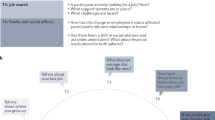Abstract
The interview is the basic tool of qualitative research. There is a lot of technical writing about interviews, but very little about where you interview and what it says about you or them. Yet this is part of building a more complete picture of the individual beyond being a mere ‘subject’. Interview location can convey power relationships or knowledge and the choice of location affects the knowledge gained by that interview. The location itself should be seen as part of knowledge interpretation and itself plays a part in knowledge creation as a cultural product and producer. Reading a room is a skill in itself, and choice of location can be critical in setting a context for open or closed discussion. Place matters.
Access this chapter
Tax calculation will be finalised at checkout
Purchases are for personal use only
Similar content being viewed by others
Notes
- 1.
The irony here being that a book called Failing in the Field does not say all that much about the actual field.
- 2.
This is undoubtedly because Ecker’s excellent paper discusses the issues with regard to interviewing homeless and vulnerable people in the USA, where there are clear issues about authority and power.
References
Agnew, J. 2011. Space and place. In The Sage handbook of geographical knowledge: Space and place, ed. J. Agnew and D.N. Livingston, 1–18. London: Sage.
Berg, B.L. 2007. Qualitative research methods for the social sciences. London: Pearson.
Duffield, M. 2012. Challenging environments: Danger, resilience and the aid industry. Security Dialogue 43 (5): 475–492.
Ecker, J. 2017. A reflexive inquiry on the effect of place on research interviews conducted with homeless and vulnerably housed individuals. Forum: Qualitative Social Research 18 (1).
Elwood, S., and D. Martin. 2000. “Placing” interviews: Location and scales of power in qualitative research. The Professional Geographer, 52 (4 November): 649–657.
Gagnon, M., J.D. Jacob, and J. McCabe. 2015. Locating the qualitative interview; reflecting on space and place in nursing research. Journal of Research in London 20 (3): 203–215.
Herzog, H. 2005. On home turf: Interview location and its social meaning. Qualitative Sociology 28 (1): 25–47.
Hubbard, P., R. Kitchin, and G. Valentin. 2004. Editors’ introduction. In Key thinkers on space and place, ed. P. Hubbard, R. Kitchin, and G. Valentine, 1–16. London: Sage.
Karlan, D., and J. Appel. 2016. Failing in the field: What we can learn when field research goes wrong. Princeton: Princeton University Press.
Kvale, S. 1996. InterViews: An introduction to qualitative research interviewing. Thousand Oaks, CA: Sage.
Law, J. 2004. After method: Mess in social science research. Basingstoke: Routledge.
Lewis, N. 1978. Naples ’44: An intelligence officer in the Italian Labyrinth, William Collins. New York: Eland Publishing. A book everyone working in post-conflict should read.
Mosley, L. 2013. Interview research in political science. New York: Cornell University Press.
Peake, Gordon. 2014. Beloved Land: stories, struggles, and secrets from Timor-Leste. London: Scribe UK.
Poland, B., P. Lehoux, D. Holmes, et al. 2005. How place matters: Unpacking technology and power in health and social care. Health and Social Care in the Community 13 (2): 170–180.
Author information
Authors and Affiliations
Corresponding author
Editor information
Editors and Affiliations
Rights and permissions
Copyright information
© 2021 The Author(s)
About this chapter
Cite this chapter
Jackson, P. (2021). Interview Locations. In: Mac Ginty, R., Brett, R., Vogel, B. (eds) The Companion to Peace and Conflict Fieldwork. Palgrave Macmillan, Cham. https://doi.org/10.1007/978-3-030-46433-2_7
Download citation
DOI: https://doi.org/10.1007/978-3-030-46433-2_7
Published:
Publisher Name: Palgrave Macmillan, Cham
Print ISBN: 978-3-030-46432-5
Online ISBN: 978-3-030-46433-2
eBook Packages: Political Science and International StudiesPolitical Science and International Studies (R0)




